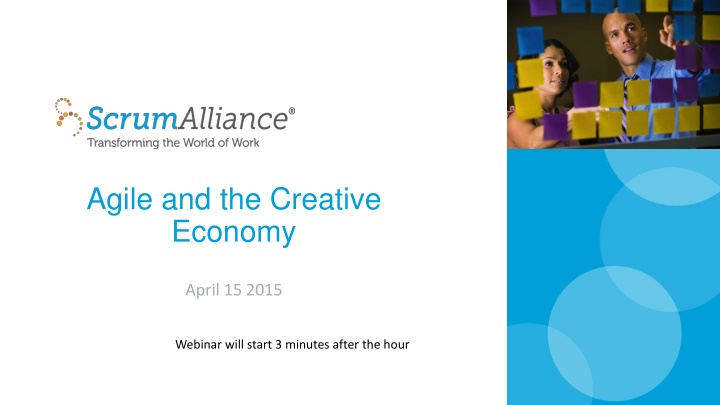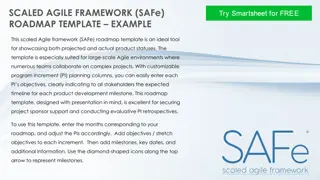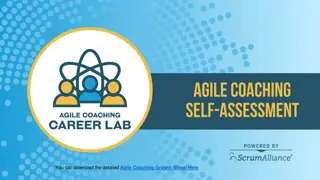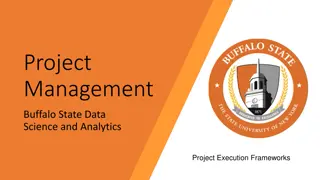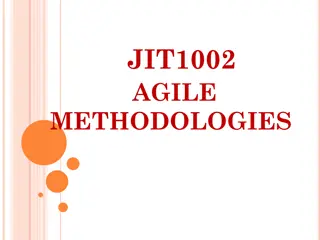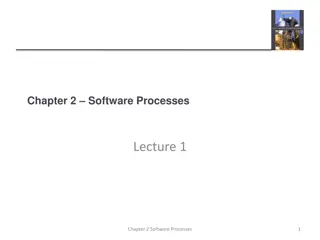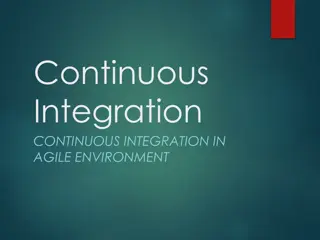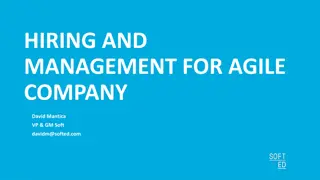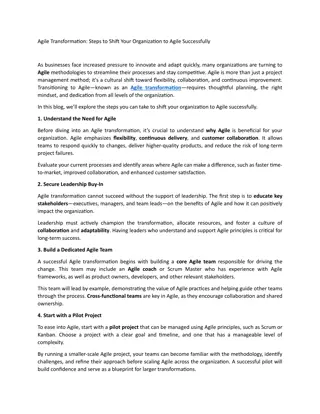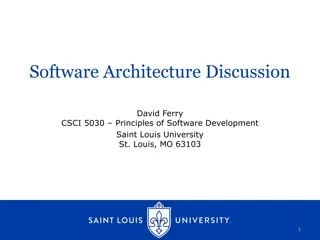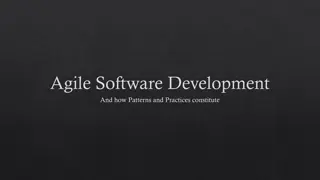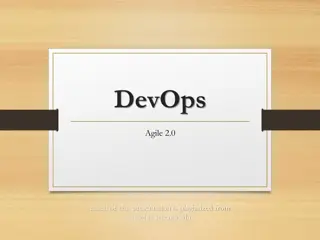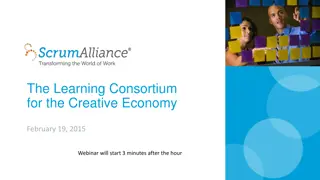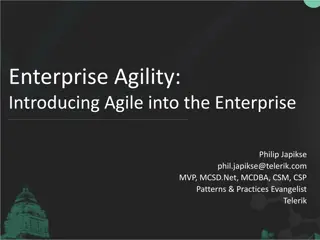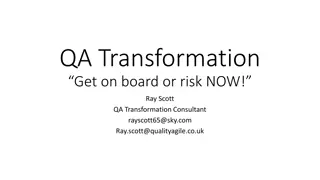Agile and the Creative Economy Webinar
Learn about the Agile approach in the context of the Creative Economy through insights from experts like Steve Denning, Peter Stevens, and Simon Roberts. Discover the role of the Learning Consortium in fostering innovation and growth in today's economy.
Download Presentation

Please find below an Image/Link to download the presentation.
The content on the website is provided AS IS for your information and personal use only. It may not be sold, licensed, or shared on other websites without obtaining consent from the author.If you encounter any issues during the download, it is possible that the publisher has removed the file from their server.
You are allowed to download the files provided on this website for personal or commercial use, subject to the condition that they are used lawfully. All files are the property of their respective owners.
The content on the website is provided AS IS for your information and personal use only. It may not be sold, licensed, or shared on other websites without obtaining consent from the author.
E N D
Presentation Transcript
Agile and the Creative Economy April 15 2015 Webinar will start 3 minutes after the hour
What is the Learning Consortium? A. B. C. D. Who is presenting today? Steve Denning is a board member of Scrum Alliance and combines several decades of management experience at the World Bank with many years of consulting and research on leadership and management issues. He now writes for Forbes.com. He is the author of eight books, including The Leader s Guide To Radical Management (2010) and The Leader s Guide To Storytelling (2010). Peter Stevens a Swiss-American Scrum Trainer, based in Switzerland. His focus is on helping companies become better at innovation and product development. His coaching focus is on developing start-ups to medium organizations to meet the challenges of today economy. I teach teams, their leaders, their management and their stakeholders to do Scrum well, to understand Scrum deeply, and to live Scrum values without obsessing over the details! Simon Roberts is a management consultant, Agile coach and Certified Scrum Trainer based in Berlin, Germany. He speaks regularly on topics such as Radical Management, Intrinsic Motivation in Scrum Teams and Enterprise Scrum Transitions. He works with organizations large and small to help them achieve better results by leveraging the power of self-organizing teams. He has contributed as coach, consultant and trainer to several large-scale Agile transitions, including at Allianz and Deutsche Telekom. 2
What is the Learning Consortium? A. B. C. D. Our panel: Two other members of the Learning Consortium core team of Engineering at Northwestern University. He teaches Entrepreneurial Selling and Scaling with the application of advanced Agile mind-sets and methods; he is a serial entrepreneur and was a founding partner in Jabbok River Group, which invests in early-stage companies to accelerate innovation and growth. Michael Pacanowsky is the director of the Center for Innovative Cultures at the Bill and Vieve Gore School of Business at Westminster College in Salt Lake City, Utah. He is also the Gore-Giovale Chair in Business Innovation at Westminster College. He worked for several decades with W. L. Gore and Associates. Jay Goldstein is an adjunct lecturer in entrepreneurship at McCormick School 3
The Learning Consortium for the Creative Economy A. B. C. D. Poll I participated or saw a recording of either the January 21 webinar or the February 19 webinar Yes No 4
Update on the Learning Consortium and the Creative Economy A. B. C. D. Agenda A. Update on the Creative Economy & the Learning Consortium B. Radical Managementsm in Germany C. Radical Managementsm in Switzerland D. Q&A 5
The Learning Consortium for the Creative Economy A. B. C. D. What is the Creative Economy? The term, Creative Economy , is passing into the common vocabulary The New Yorker, February 2015 6
Update on the Learning Consortium and the Creative Economy A. B. C. D. The Creative Economy at the team level: Scrum/Agile Agile/Scrum Bureaucracy Boss Team` Customer Product owner Individuals 7
Update on the Learning Consortium and the Creative Economy A. B. C. D. The Creative Economy at the level of the firm Creative economy Traditional economy Cloud Teams Networks Ecosystems Platform Customer 8
Update on the Learning Consortium and the Creative Economy A. B. C. D. There are many partial transitions Plugging Scrum teams into a bureaucracy creates friction Boss Boss Boss Scrum Product owner Team Customer Boss Boss Boss 9
Update on the Learning Consortium and the Creative Economy A. B. C. D. Poll results from the January webinar Where I work, there is tension between way Scrum teams are run and the way the rest of the organization is managed Yes 40% 76% In part No Not sure Not relevant 36% 7% 3% 13% 10
Update on the Learning Consortium and the Creative Economy A. B. C. D. Poll: Where I work, there is tension between way Scrum teams are run and the way the rest of the organization is managed. To some extent Yes Not sure No Not relevant to my firm 11
Update on the Learning Consortium and the Creative Economy A. B. C. D. What is the Learning Consortium? The Learning Consortium is a group of firms that want to learn together about continuous customer-focused innovation 12
Update on the Learning Consortium and the Creative Economy A. B. C. D. Who is in the Learning Consortium? Twelve firms have decided to join. Agile coaching/training Design software Technology consultant Logistics Networks/telecom Auto parts Software/electronics Software design Finance Gaming Agile enterprise solutions Finance <500 Europe US US/UK US Europe Europe US US US US] US Europe Agile42 Autodesk Brillio CH Robinson Ericsson Magna International Microsoft Menlo Innovations PENSCO Trust [gaming company] SolutionsIQ SWIFT ~8,000 na ~11,000 ~120,000 ~130,000 ~130,000 <500 <500 ~1,000 <500 ~2,000 13
Update on the Learning Consortium and the Creative Economy A. B. C. D. How the Learning Consortium will work Members will select the five most interesting firms for site visits. Site visits will take place from May through September 2015. An on-line conversation space for members will be established. An informal advisory panel will be available for consultation by members. A conference will be organized later in 2015. A report on findings of the consortium will be prepared in consultation with members In November 2015, the Drucker Forum will devote a session to the outcome 14
Radical Management in Germany A. B. C. D. Radical Management Simon Roberts 15
Radical Management A. B. C. D. What s the Problem? Short-termism through over focus on shareholder value rather than customer delight Success not sustainable Poor quality Knowledge workers not engaged All of the creative things in companies are allergic to command and control management: Product development Marketing Knowledge management Goal Make money for shareholders Communications Role Top down commands Managers as controller Efficiency, cost cutting Bureaucracy: rules, plans, reports Values Coordination 16
Radical Management A. B. C. D. The Five Shifts of Radical Management Goal Goal Make money for shareholders Delighting customers Communications Role Communication Role Top down commands Managers as controller From controller to enabler Peer to peer collaboration Transparency Improvement Sustainability Efficiency, cost cutting Bureaucracy: rules, plans, reports Direct Line of Sight Agile, Scrum, Kanban From value to values Values Coordination Coordination Values 17
Radical Management in Germany A. B. C. D. Radical Management in Germany Simon Roberts 18
Radical Management in Germany A. B. C. D. Poll: Where I work, my organization fits on the spectrum at: 3 1 4 2 5 Delight customers Managers = enablers Agile, iterative coordination Transparency, improvement Horizontal communications Shareholder value Manager = controller Waterfall monitoring Efficiency, predictability Top down communications 1 2 3 4 5 19
Radical Management in Germany A. B. C. D. My Journey with Radical Management Simon Roberts (Berlin) My Journey with Radical Management Simon Roberts (Berlin) Steve Denning s Keynote on Radical Management @ Scrum Gathering London Early 2011 2011 January 2012 March 2012 Read "A Leaders Guide To RadicalManagement" Radical Management workshop in Washington D.C. with Steve Denning and Peter Stevens Stoos Gathering Radical Management integrated into Agile Training and Coaching July 2012 Radical Management workshop in Berlin with Steve Denning and Simon Roberts Around 10 clients where Radical Management is an active topic 2015 Integrated into CSM and CSPO training and as separate 2-day Agile Manager training
Radical Management in Germany A. B. C. D. Example 1: Advertising Sales Company Company s clients are advertising agencies in Madison Avenue NYC 2-day Radical Management training for whole leadership team (CEOs + direct reports) Follow up feedback / coaching After two months New focus on customer delight, cross-functional teams and pair- working
Radical Management in Germany A. B. C. D. Example 2: Medium-Sized Product Development Company Goal Company is using Scrum for product development, wants to extend use of Agile Management consulting project Board members rated their approach on a sliding scale on the five shifts (using flip-charts and sticky dots) Where are they currently? Where do they want to be? Generated SMART actions on how to get to where they want to be Delighting customers Role Communication From controller to enabler Peer to peer collaboration Transparency Improvement Sustainability Direct Line of Sight Agile, Scrum, Kanban From value to values Coordination Values
Radical Management in Germany A. B. C. D. Example 3: Business Unit in a Large Enterprise Complex product development (used by millions of households in Germany) Radical Management workshop for leadership team (circa 20) Follow up feedback and coaching After two months: Managers working more as enablers, less as directors Leadership storytelling used actively Managers have more time for strategy!
Radical Management in Germany Radical Management in Practice: Key Learnings A. B. C. D. Goal Provides the missing link - how to scale Agile into the whole organisation Not a magic bullet needs disciplined execution combined with continuous innovation Raises awareness in management of: The importance of customer delight for sustainable success What managers need to do to help knowledge knowledge-workers be engaged That Agile is not just for product development The C-Suite needs to be involved! Delighting customers Role Communication From controller to enabler Peer to peer collaboration Transparency Improvement Sustainability Direct Line of Sight Agile, Scrum, Kanban From value to values Coordination Values 24
Radical management in Switzerland A. B. C. D. Radical Management in Switzerland Peter Stevens 25
Radical management in Switzerland A. B. C. D. My Journey with Radical Management Peter Stevens (Z rich) Communities Radical Management Gathering Communities Washington DC Today Collaboration with Steve, Simon May 2011 Scrum Gathering in London Pre-Publishing Reviewer for TLG to Radical Management P Spring 2012 Stoos Gathering Stoos, Switzerland October 2011 2010 January 2012 Pushing Granite Soap on a wet floor Sustainability
Radical management in Switzerland A. B. C. D. Peter s Tales from Switzerland Goal Delighting customers Role Communication Goal From controller to enabler Peer to peer collaboration Make money for shareholders Communications Role Top down commands Managers as controller Transparency Improvement Sustainability Direct Line of Sight Agile, Scrum, Kanban From value to values Coordination Values Efficiency, cost cutting Bureaucracy: rules, plans, reports Values Coordination 27
Radical management in Switzerland A. B. C. D. Using traditional management methods to transform is risky Large Insurance Company CTO decided: Do Scrum Goal Make money for shareholders Communications Good news 4 years later, still doing Scrum Role Peer to peer collaboration Do Scrum! Bad news Rocky road Internal conflict Efficiency, cost cutting Direct Line of Sight Agile, Scrum, Kanban Values Coordination 28
Radical management in Switzerland A. B. C. D. Radical Management transformed how I help transformations Think about your best project ever ! Is this your current project?
Radical management in Switzerland A. B. C. D. The transition to a radical mindset must occur at all levels Large, recently merged Media Company Goal Before starting, informed and consulted everyone Audience is everything Communications Role Peer to peer collaboration If you want to do Scrum, I ll support you Management gave permission and support Minimal passive resistance, grief response, or other traditional headaches of transformation Efficiency, cost cutting Direct Line of Sight Agile, Scrum, Kanban Values Coordination 30
Radical management in Switzerland A. B. C. D. The transition is only complete when the governance is on board C2C company CTO wanted the change, proceeded much like the media company Got everyone, including the CEO on to support the new approach Company restructured around lines of business One day, there was a new CEO... Governance CEO CFO CTO CMO CXO 31
Radical management in Switzerland A. B. C. D. What does Scrum have to do with running a company? Product Development Pre-Funding Startup Feature requests Something that works Inspect and Adapt Time-boxing impediments 32
Radical management in Switzerland A. B. C. D. The product isn t the product. The company is the product. Product Development Pre-Funding Startup Feature requests Goals, objectives Something that works Inspect and Adapt Time-boxing Inspect and Adapt Time-boxing impediments impediments 33
Radical management in Switzerland A. B. C. D. A leader must make decisions. Why this decision now? Why is this decision difficult? Product Development Pre-Funding Startup Decisions Feature requests Goals, objectives Something that works Inspect and Adapt Time-boxing Inspect and Adapt Time-boxing impediments impediments 34
Radical management in Switzerland A. B. C. D. Radical Management in Practice: Key Learnings Goal People are their own best storytellers! Delighting customers The traditional eco-system is naturally stable. The radical ecosystem requires energy and passion to keep it in place. Role Communication From controller to enabler Peer to peer collaboration Changing the goal and the role are key Transparency Improvement Sustainability Direct Line of Sight Agile, Scrum, Kanban From value to values Radical Management and Scrum complement each other perfectly! Coordination Values 35
Questions? A. B. C. D. More Information on Radical Management Steve Denning s blog on forbes.com (600+ articles) http://www.forbes.com/sites/stevedenning/ The Leader s Guide to Radical Management, Stephen Denning (2010) http://radicalmanagement.org ALSO: These slides, and a recording of this session: https://www.scrumalliance.org/why-scrum/learning- consortium/learning-consortium-resources 41
Thank you for attending The Learning Consortium for the Creative Economy February 19, 2015
